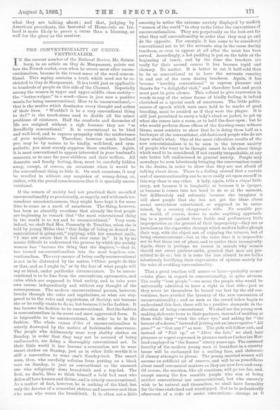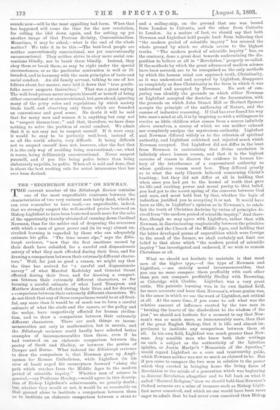THE CONVENTIONALITY OF UNCON- VENTIONALISM.
IN the current number of the National Review, Mr. Saints- bury, in an article on Guy de Maupassant, points out how the French realist, even when he strove most after uncon- ventionalism, became in the truest sense of the word conven- tional. This saying contains a truth which need not be re- stricted to Guy de Maupassant. It is a truth just as applicable to hundreds of people on this side of the Channel. Especially among the women in upper and upper-middle class society— the "better-vulgar," in a word—there is just now a positive mania for being unconventional. How to be unconventional,— that is the motive which dominates every thought and action of their lives. "Wouldn't it be a very conventional thing to do ?" is the touch-stone used to decide all the minor problems of existence. Half the comforts and decencies of life are resigned without a sigh because they are " so dreadfully conventional." It is conventional to be kind and well-bred, and to express sympathy with the misfortunes of your neighbours. Therefore, however much inclined you may be by nature to be kindly, well-bred, and sym- pathetic, you must sternly suppress those emotions. Again, it is most conventional to appear interested in your husband's concerns, or to care for your children and their welfare. All domestic and family feeling, then, must be carefully hidden away, except, of course, on occasions when it would be the conventional thing to hide it. On such occasions, it may be revelled in without any suspicion of wrong-doing, or, rather, with the proud consciousness that it is specially uncon- ventional.
If the women of society had not practised their so-called unconventionality so persistently, so eagerly, and with such tre- mendous conscientiousness, they might have kept it for some time to come as a mark of smartness. The thing, however, has been so absurdly overdone that already the best people are beginning to remark that "the most conventional thing in the world is to try and be unconventional." Very soon, indeed, we shall find Mrs. Ponsonby de Tomkins, when she is told by young Midas that "this dodge of being so deuced un- conventional is going-out," replying, with her sweetest smile, " I was not aware that it had ever come in." It is by no means difficult to understand the process by which the society woman has "become the thing that she dispises,"—that is, has turned unconventionalism into the most hopeless con- ventionalism. The very essence of being really unconventional is not to be distracted by the notion, Other people do this or that, and so I ought to," or by the fear of what people will say or think, under particular circumstances. To be uncon- ventional is to be free from the conventions, agreements, and rules which are supposed to bind society, and to take your own course independently and without any thought of the consequences. The modern unconventional person, however, breaks through the rules and regulations, or what are sup- posed to be the rules and regulations, of Society, not because she or he really wants to do so, but because it is the fashion. It has become the fashion to be unconventional. But the fashion is conventionalism in its worst and most aggravated form. It is impossible to be unconventional, in order to be in the fashion. The whole raison d'être of unconventionalism is utterly destroyed by the motive of fashionable observance. The people who deliberately wear very shabby clothes on Sunday, in order that they may not be accused of being endimanchas, are doing a thoroughly conventional act. In their little world it has become a convention not to wear smart clothes on Sunday, just as in other little worlds it is still a convention to wear one's Sunday-best. The smart man, then, who carefully refrains from putting on a black coat on Sunday, is just as conventional as the unsmart one who religiously dons broadcloth and a top-hat. The first, no doubt, likes to think himself a bold bad man who defies all laws human and divine, and is utterly unconventional. As a matter of fact, however, he is nothing of the kind, but only the devotee of a somewhat stricter and narrower sect than the man who wears the broadcloth. It is often not a little amusing to notice the extreme anxiety displayed by moder# "women of the world " to obey to the letter the conventions of unoonventionalism. They are perpetually on the look-out for what they call conventionality in order that they may go and do the opposite. For example, it has come to be considered conventional not to let the servants stop in the room during luncheon, or even to appear at all after the meat has been served. Accordingly, a hot pudding is put on the table at the beginning of lunch, and by the time the lunchers are ready for their second course it has become tepid and clammy. No matter. It is better to eat it half-cold than to be so conventional as to have the servants running in and out of the room during luncheon. Again, it has become "terribly conventional" to express pleasure and thanks for "a delightful visit," and therefore host and guest must part in grim silence. This refusal to give expression in words to any of the minor forms of kindly feeling, is indeed cherished as a special mark of smartness. The little polite- nesses of speech which were once held to be marks of good breeding, must be avoided as if they were the plague. It is still just permitted to carry a lady's cloak or jacket, to get up when she comes into a room, or to hold the door open ; but he who would perform these offices of the drawing-room without blame, must contrive to show that he is doing them half as a burlesque of the conventional, old-fashioned people who do not know what's what. One of the most ridiculous results of the new conventionalism is to be seen in the intense anxiety of people who want to be thought smart to talk about things which used to be considered, if not exactly unspeakable, at any rate better left undiscussed in general society. People may nowadays be seen laboriously bringing the conversation round to the drains, in order to show that they are not afraid of talking about them. There is a feeling abroad that a certain seal of unconventionality can be more easily set upon oneself in this way than in any other. A lady, again, tells a risquo little story, not because it is laughable, or because it is apropos, or because it comes into her head to do so at the moment, but deliberately and solemnly because she imagines it will show people that she has not got the ideas about social correctness entertained, or supposed to be enter- tained, by a country clergyman's wife. No sensible per- son would, of course, desire to make anything approach- ing to a protest against these feeble and perfunctory little improprieties on the ground of their impropriety—they are as harmless as the cigarettes through which modern ladies plough their way, with the object not of enjoying the tobacco, but of being unconventional—but at the same time it is impossible not to feel them out of place, and to notice their incongruity. Again, there is perhaps no reason in morals why women should not swear parlour-oaths, granted that men are per- mitted to do so ; but it is none the less absurd to see ladies laboriously fortifying their expressions of opinion merely for the sake of avoiding conventionality.
That a great reaction will sooner or later—probably sooner —take place in regard to conventionality, is quite obvious. The really " best people "—we mean the people who would be universally admitted to have a right to that title—just as they never let themselves be bound too fast by the old con- ventions, have avoided the tyranny of the new convention of unconventionality; and as soon as the crowd below begin to understand this fact, there will be a positive stampede in the direction of being conventional. We shall see the young men making elaborate bows to their partners, instead of nodding at them while they "wink the other eye," and asking for " the honour of a dance," instead of jerking out an interrogative " All gone ?" or " Got any P" as now. The girls will follow suit, and instead of "Full up," or "After the fair," we shall hear pleasure or regret expressed in phrases such as Catherine Mor- land employed in " the Rooms " ninety years ago. The assumed ferocity of the modern young man at breakfast in a country house will be exchanged for a smiling face, and elaborate if clumsy attempts to please. The young married women will assume an artificial air of reserve, and will be as punctilious about small ceremonial matters as they are now free-and-easy. Of course, the reaction, like all reactions, will go too far, and, except among the few sensible people who aim at being neither conventional nor unconventional, but who sincerely wish to be natural and themselves, we shall have formality for the time enshrined and worshipped. Not to be pedantically observant of a code of social conventions—strange as it sounds now—will be the most appalling bad form. When that has happened will come the time for the new revolution, for rolling the idol down again, and for setting up yet another image of that Protean divinity, Conventionalism. Meantime, it may be asked,—what is the end of the whole matter P We take it to be this :—The best-bred people are neither conventionally conventional, nor yet conventionally unconventional. They neither strive to obey mere social con- ventions blindly, nor to break them blindly. Instead, they obey them or break them, as may be right under the special circumstances, or as the particular convention is well or ill- founded, and in harmony with the main principles of taste and social conduct. An old family servant, talking to one of her fellows about her master, once laid it down that " true gentle- folks never suspects theirselves." That was a great saying. The well-bred person never suspects himself or herself of being either conventional or unconventional, but goes ahead, ignoring many of the petty rules and regulations by which society binds itself, and observing only those which are founded on convenience and good sense. No doubt it will be said that for many men and women it is anything but easy not to " suspect themselves ; " and that, therefore, we have done nothing to solve the problem of social conduct. We admit that it is not easy not to suspect oneself. If it were easy, it would be easy to be perfectly well-bred, instead of, as all the world admits, very difficult. It being difficult not to suspect oneself does not, however, alter the fact that it is the only way of avoiding being conventional,—or, what is worse, being deliberately unconventional. Never suspect yourself, and if you like being polite better than being elaborately unpolite, be polite. When all is said and done, that is about the best working rule for social intercourse that has ever been devised.



































 Previous page
Previous page